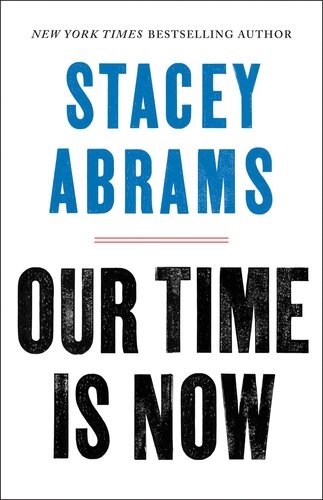
Our Time Is Now
Power, Purpose, and the Fight for a Fair America
- اطلاعات
- نقد و بررسی
- دیدگاه کاربران
نقد و بررسی

Starred review from May 15, 2020
A detailed expos� of how our democracy has been eroded--and a plan to fix it--from an up-and-coming national leader. "My parents raised the six of us in Mississippi, my mother an underpaid librarian and my father a dyslexic shipyard worker," writes Abrams, whose earliest memory of the voting process involved accompanying her parents to the polls. Her more recent memories are more bitter: In 2018, she lost the Georgia gubernatorial race to Brian Kemp in what she believes was an unfairly conducted election. "For a New American Majority--that coalition of people of color, young people, and moderate to progressive whites--to be successful, we have to stop letting them tell us who we are and how to succeed," she writes. In succinct but thorough chapters, she lays out the grim history of voting rights, both in policy and practice, from the crafting of the Constitution to the present day. The devious creativity of the techniques used to suppress votes is jaw-dropping, and Abrams provides detailed examples from around the country. Among them are obstacles to registration, voter ID "exact match" policies and other restrictions, unexpected poll closings, restriction of early and absentee voting, ballot rejection, miscounting, manipulation of provisional ballots, gerrymandering, and a broken infrastructure, including malfunctioning machines and interminable lines. The author's plan to solve the problem "short-circuits" debate about identity politics, and she clearly explains how to enact change at the federal level. The census, for example, can be "an organizing tool we can use to salvage democracy." Abrams informs readers how "democracies rarely fail today because of military coups or foreign invasion. Instead their death is gradual, coming slowly and over time with an erosion of rights and an accumulation of attacks on the institutions that form their backbone." An afterword on COVID-19 emphasizes the urgency of the 2020 election. If you are feeling hopeless about politics, this well-informed blueprint for change may begin to restore your faith.
COPYRIGHT(2020) Kirkus Reviews, ALL RIGHTS RESERVED.

June 8, 2020
In this impassioned and carefully researched account, former Georgia gubernatorial candidate Abrams (Lead from the Outside) examines the methods and consequences of voter suppression in America and explains why she won’t officially concede her 2018 race against Republican Brian Kemp. Abrams sketches the history of minority disenfranchisement from the 1857 Supreme Court decision barring African-Americans from citizenship to the 2013 voiding of federal preclearance requirements for electoral changes in districts covered under the 1965 Voting Rights Act. She also documents how the “exact match” system Kemp installed when he served as Georgia’s secretary of state “led to 53,000 voter registrations being held hostage in 2018, 80 percent of whom were people of color.” Voter suppression has helped fuel the recent proliferation of laws targeting abortion providers, she contends, despite a “national consensus” in favor of the right to an abortion. Abrams’s reform proposals include federal laws mandating automatic registration for eligible voters, outreach to marginalized communities about the importance of the census, and national staffing and equipment standards for polling places. Blending personal history, statistical analysis, and detailed policy proposals, Abrams presents a persuasive, if wonkish, argument that any progressive legislative agenda must begin with voting reform. Liberals will be inspired.

Starred review from June 1, 2020
When Abrams' run for the governorship of Georgia in 2018 fell short, she touted the enormous success of her campaign in increasing voter turnout and captured national attention. In her powerful new book, following Minority Leader (2018), Abrams recounts her long involvement in voter issues, including her ongoing efforts to educate and activate voters. Along the way she provides an historical perspective on the efforts of the wealthy and powerful to disenfranchise the marginalized, from Native Americans to African Americans, Hispanics, and women, with the help of laws and Supreme Court decisions that have codified disadvantage and disenfranchisement. Voter suppression tactics have changed from the brutal use of police and rabid dogs to more sophisticated and insidious methods involving provisional ballots, restrictive voter IDs, and pernicious redistricting. Abrams sees a New American Majority comprised of racial minorities and a younger population with more progressive views. She argues for the restoration of the Voting Rights Act among myriad other specific remedies, and describes voting as an act of faith, the ultimate power in a democracy that has been too long denied to those who built this country from theory to life. For a nation in the throes of a pandemic and wracked by four years of polarized politics, this is an important and timely book.(Reprinted with permission of Booklist, copyright 2020, American Library Association.)

July 1, 2020
In 2018, politician, lawyer, and author Abrams ran for governor in the state of Georgia. As a progressive Democrat, Abrams aimed to appeal to working-class Blacks, those in the LGBTQ community, and Latinx Americans. She proved successful in reaching these groups; however, she lost to Republican Brian Kemp amid charges of voter suppression through gerrymandering and irregularities in voter registration and ID requirements. In this newest work, Abrams chronicles her campaign; the history of voter suppression, especially its impact on Black communities; and the importance of voting. Through historical research and personal history, Abrams makes a compelling case for the importance of people's right to vote. She acknowledges that the system of voting in the United States is flawed and the founding of the country is problematic, if not outright hypocritical. Yet, she maintains that it is not hopeless if politicians grant and recognize the importance of those who exist on society's margins. VERDICT Insight into Abrams and her personal and political journey are the main strengths of this important book. Those not familiar with U.S. voting history will find it to be especially informative.--Leah Huey, Dekalb P.L., IL
Copyright 2020 Library Journal, LLC Used with permission.




دیدگاه کاربران